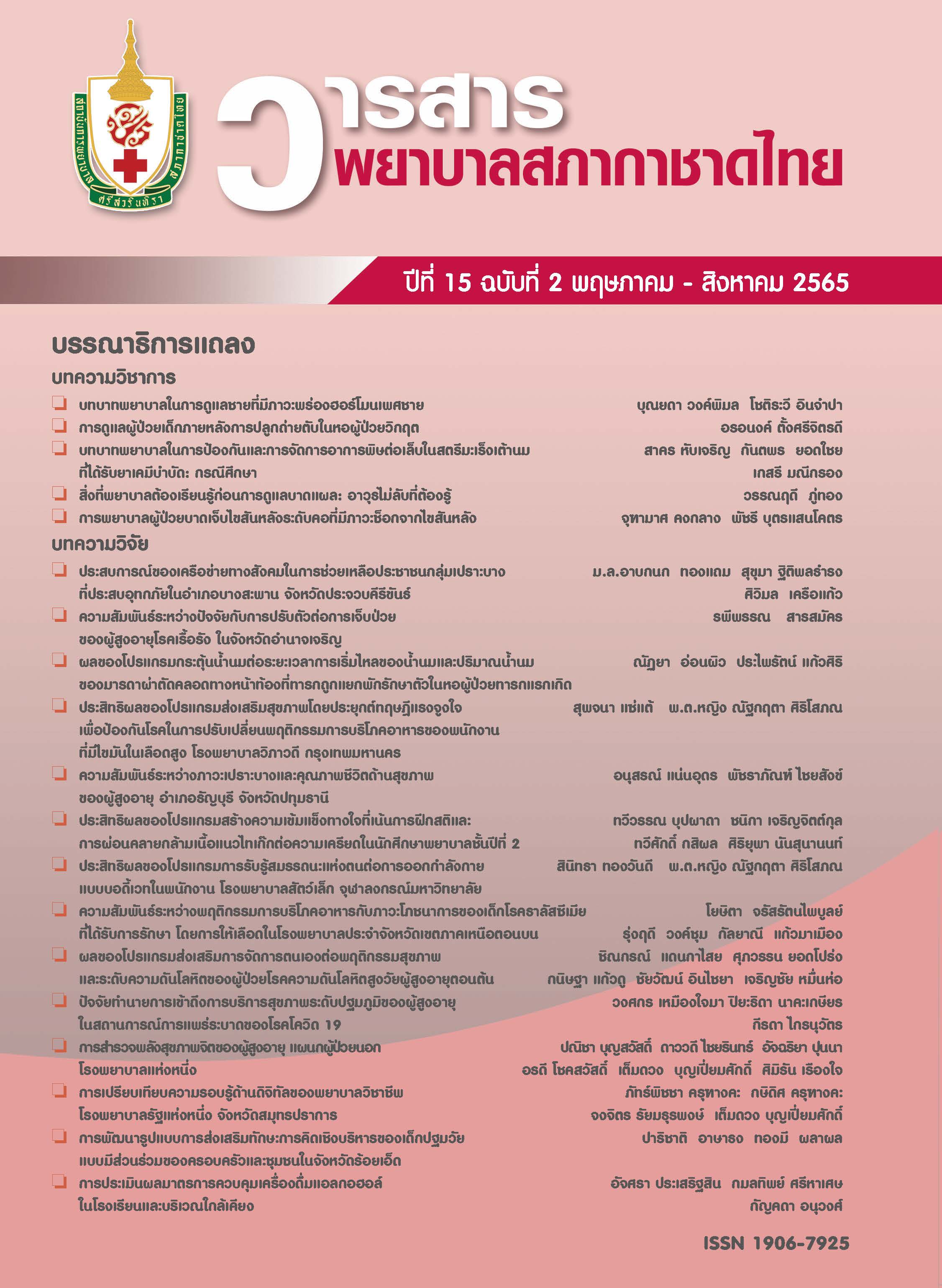Relationship between Factors and Chronic Illness Adaptation Among Older Adults in Amnat Charoen Province
Keywords:
adaptation to illness, chronically ill elderly, chronic illnessAbstract
The purposes of this descriptive research were to study the adaptation to illness of chronically ill elderly patients in the Sangnokta Health Promoting Hospital. Participants consisted of 140 chronically ill elderly patients who were selected using the multi–stage random sampling technique. Data were analyzed using statistical methods, including mean, percentage, standard deviation, Biserial correlation, Chi – square, and Pearson’s correlation.
The major findings were as follows: education, perception of family reaction to illness, social support, perception of health service, and problem-focused coping were significantly positively correlated with the adjustment to illness of chronically ill elderly patients at the .05 level of significance. The adjustment to illness of chronically ill elderly patients was found to be at a moderate level. Age was significantly negatively correlated with the adjustment to illness of chronically ill elderly patients at the .05 level of significance. Sex, length of illness, perception of illness, and emotionally-focused coping were not correlated with the adjustment to illness of chronically ill elderly patients. The results from this study can be applied in the planning and staging of activities for chronically ill elderly patients to support the patients’ self-adaptation in living happily and longer with chronic illness.
References
Kang HW, Park M, Wallace Hernandez JP. The impact of perceived social support, loneliness, and physical activity on quality of life in South Korean older adults. J Sport Health Sci 2018;7(2):237-44. doi: 10.1016/j.jshs.2016.05.003.
Chanawongse K, Isarangura Na Ayudhya V, Dansawadikul T. The study of factors affecting sustainability and continuity of the elderly health promotion club, the 7th Khon Kaen Health Center, Muang district, Khon Kaen province. College of Asian Scholars Journal 2016;6(1):136-41. (in Thai)
Sansamak R. The effect of public mild social support program on loneliness in older persons resided in public welfare for the aged. J Royal Thai Army Nurses 2017;18(1): 251-9. (in Thai).
Department of older Persons. Older Statistics 2019 [Internet]. 2019 [cited 2020 Feb 14]. Available from: http://www.dop.go.th/download/knowledge/th1580099938-275_1. pdf.
Birren J, Sloane R, Cohen G. Handbook of mental health and aging. 2nd ed. California: Academic Press; 2011.
Hacialioglu N, Ozer N, Yilmaz karabulutlu E, Erdem N, Erci B. The quality of life of family caregivers of cancer patients in the East of Turkey. Eur J Oncol Nurs 2010;14(3):211-7. doi: 10.1016/j.ejon.2010.01.017.
Voss TS, Ele JJ, Wielinski CL, Aminoff MJ, Bandyopadhyay D, Chou KL, et al. Fall frequency and risk assessment in early Pakinson’s disease. Parkinsonism Relat Disord 2012;18(7):837-41. doi: 10.1016/j.parkreldis.2012.04.004.
Haber J. Comprehensive psychiatric nursing. 2nd ed. New York: McGraw-Hill; 1987.
Thorndike M. Correlational procedures for research. New York: Gradner Press; 1978.
Brandt PA, Weinert C. The PRQ: a social support measure. Nurs Res 1981;30(5):277-80.
Lazarus RS, Folkman S. Stress, appraisal, and coping. New York: Springer Publishing; 1984.
Adams KB, Leibbrandt S, Moon H. A critical review of the literature on social and leisure activity and wellbeing in later life. Ageing Soc 2011;31(4):683-712.
YU Y, Hu J, Efird JT, McCoy TP. Social support, coping strategies and health-related quality of life among primary caregivers of stroke survivors in China. J Clin Nurs 2013;22(15-16):2160-71. doi: 10.1111/jocn.12251
Wagachchige Muthucumarana M, Samarasinghe K, Elgán C. Caring for stroke survivors: experiences of family caregivers in Sri Lanka - a qualitative study. Top Stroke Rehabil 2018;25(6):397-402. doi: 10.1080/10749357.2018.1481353
Waisutra C. Sasat S. Selected factors related to dysphagia in older persons with stroke. Journal of Nursing Science Chulalongkorn University 2018;30(1):84-95. (in Thai)
Allen NE, Canning CG, Sherrington C, Lord SR, Latt MD, Close JC, et al. The effects of an exercise program on fall risk factors in people with Parkinson’s disease: a randomized controlled trial. Mov Disord 2010;25(9):1217-25. doi: 10.1002/mds.23082.
Collard RM, Boter H, Schoevers RA, Oude Voshaar RC. Prevalence of frailty in community–dwelling older persons: a systematic review. J Am Geriatr Soc 2012;60(8):1487-92. doi: 10.1111/j.1532-5415.2012.04054.x
Runzer-Colmenares FM, Samper-Ternent R, Al Snih S, Ottenbacher KJ, Parodi JF, Wong R. Prevalence and factors associated with frailty among Peruvian older adults. Arch Gerontol Geriatr 2014;58(1):69-73. doi: 10.1016/j.archger.2013.07.005
Chen CY, Wu SC, Chen LJ, Lue BH. The prevalence of subjective frailty and factors associated with frailty in Taiwan. Arch Gerontol Geriatr 2010;50(Suppl 1):S43-7. doi: 10.1016/S0167-4943(10)70012-1
Downloads
Published
Issue
Section
License
Copyright (c) 2022 Srisavarindhira Thai Red Cross Institute of Nursing

This work is licensed under a Creative Commons Attribution-NonCommercial-NoDerivatives 4.0 International License.
เนื้อหาบทความหรือข้อคิดเห็นต่างๆ ในวารสารพยาบาลสภากาชาดไทยนี้ เป็นความคิดเห็นของผู้เขียนบทความ ไม่ใช่ความเห็นของกองบรรณาธิการ หรือสถาบันการพยาบาลศรีสวรินทิรา สภากาชาดไทย






